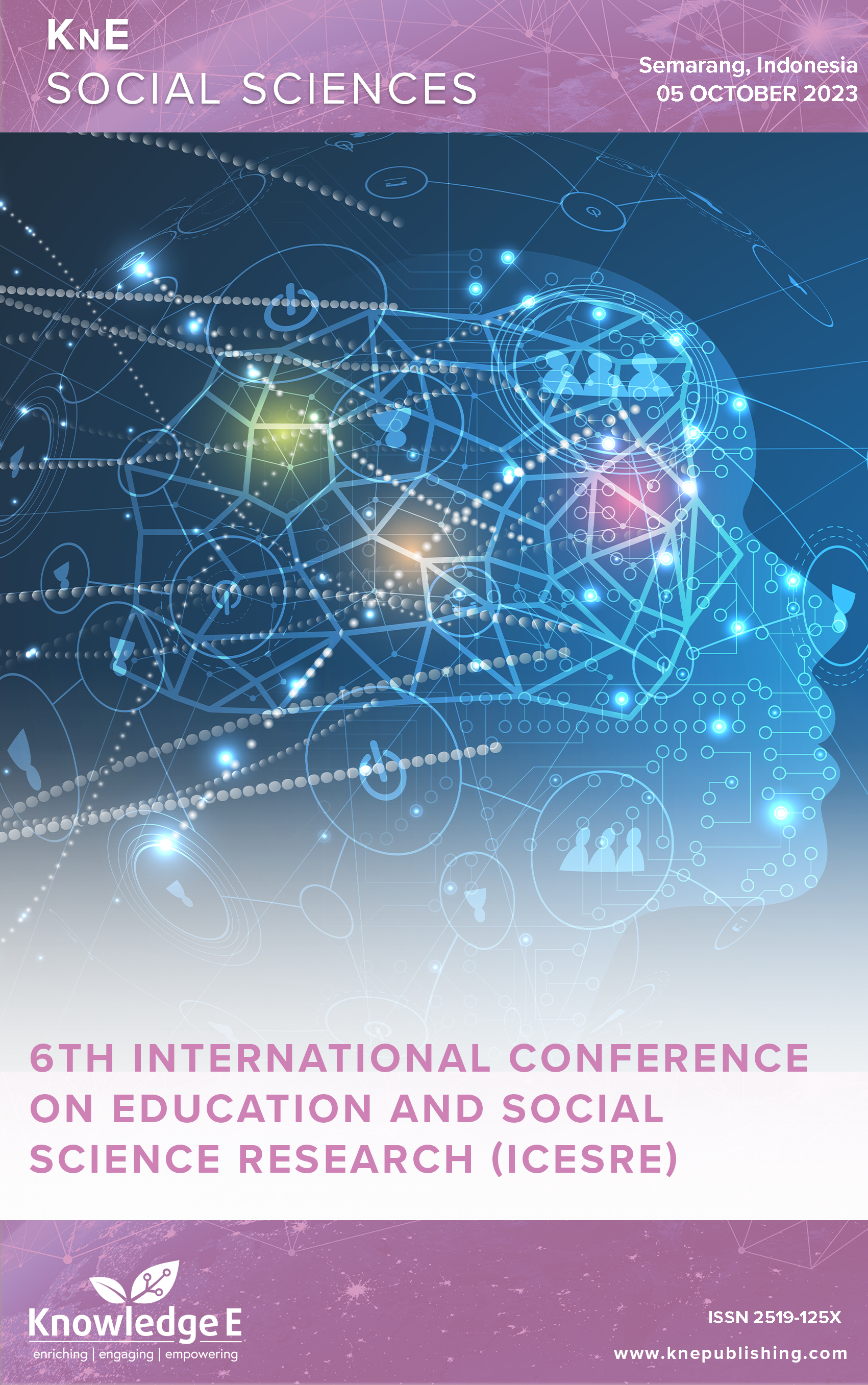Intellectual Capital Management as a Strategic Asset of Higher Education in Improving Organizational Performance
DOI:
https://doi.org/10.18502/kss.v9i6.15268Abstract
Higher education involves various kinds of science that develops and produces reliable human resources in the field of science. Higher education performance is primarily determined by the leadership’s ability to manage knowledge-based strategic assets, namely intellectual capital. This research designs all elements that form intellectual capital, such as human capital, structural capital, and relational capital, in one model according to their organizational function. The research aims to optimize the role of intellectual capital as a strategic asset for higher education to improve organizational performance. This is a survey research, where data were obtained by distributing questionnaires to higher education leaders in Surabaya, both State Higher Education (SHE) and Private Higher Education (PHE). The research produced a model for managing intellectual capital, where human capital and structural capital are independent variables for higher education performance. In contrast, relational capital is a mediator for both. The research results can guide higher education leaders in managing intellectual capital as a strategic asset determining organizational performance.
Keywords: human capital, structural capital, relational capital, organizational performance
References
Istikhoroh S, Moeljadi, Sudarma M, Aisjah S. Does social media marketing as moderating relationship between intellectual capital and organizational sustainability through university managerial intelligence? (empirical studies at private Universities in East Java). Cogent Business and Management 2021;8. https://doi.org/10.1080/23311975.2021.1905198. DOI: https://doi.org/10.1080/23311975.2021.1905198
Jose S, Chacko J. Building a sustainable higher education sector in the UAE. International Journal of Educational Management 2017;31:752–65. DOI: https://doi.org/10.1108/IJEM-05-2016-0102
Lozano R. Diffusion of sustainable development in universities’ curricula: an empirical example from Cardiff University. Journal of Cleaner Production 2010;18:637–44. https://doi.org/https://doi.org/10.1016/j.jclepro.2009.07.005. DOI: https://doi.org/10.1016/j.jclepro.2009.07.005
Acar W, Polin B. The ascent of resource-based theory as constructive rationalbehavioral integration for looking inward and outwardle information : International Journal of Commerce and Management 2015;25:603–26. DOI: https://doi.org/10.1108/IJCoMA-05-2013-0044
Kor YY, Mahoney JT. Edith Penrose’s (1959) Contributions to the Resource-based View of Strategic Management. Journal of Management Studies 2004;41:183–91. https://doi.org/10.1111/j.1467-6486.2004.00427.x.
Kor YY, Mahoney JT. Edith Penrose’s (1959) Contributions to the Resource-based View of Strategic Management. Journal of Management Studies 2004;41:183–91. https://doi.org/10.1111/j.1467-6486.2004.00427.x. DOI: https://doi.org/10.1111/j.1467-6486.2004.00427.x
Sizer J. Research and the knowledge age. Tertiary Education and Management 2001;7:227–42. https://doi.org/10.1080/13583883.2001.9967055. DOI: https://doi.org/10.1080/13583883.2001.9967055
Adams CA. Sustainability reporting and performance management in universities Challenges and benefit. Sustainability Accounting, Management and Policy Journal 2013;4:384–92. DOI: https://doi.org/10.1108/SAMPJ-12-2012-0044
Bontis N, Dragonetti NC, Jacobsen K, Roos G. The Knowledge Toolbox : A Review of the Tools Available To Measure and Manage Intangible Resources. European Management Journal 1999;17:1–20. DOI: https://doi.org/10.1016/S0263-2373(99)00019-5
Andreou AN, Bontis N. A model for resource allocation using operational knowledge assets. The Learning Organization 2007;14:345–74. https://doi.org/10.1108/09696470710749272. DOI: https://doi.org/10.1108/09696470710749272
Dumay J, Guthrie J. IC and Strategy as Practice. International Journal of Knowledge and Systems Science 2012;3:28–37. https://doi.org/10.4018/jkss.2012100103. DOI: https://doi.org/10.4018/jkss.2012100103
Pedrini MP. Human capital convergences in intellectual capital and sustainability reports. Journal of Intellectual Capital 2007;8:346–66. https://doi.org/10.1108/14691930710742880. DOI: https://doi.org/10.1108/14691930710742880
Dutot V, Galvez EL, Versailles DW. CSR communications strategies through social media and influence on e-reputation: An exploratory study. Management Decision 2016;54:363–89. https://doi.org/10.1108/MD-01-2015-0015. DOI: https://doi.org/10.1108/MD-01-2015-0015
Marr B, Gupta O, Pike S, Roos G. Intellectual capital and knowledge management effectiveness. Management Decision 2003;41:771–81. https://doi.org/10.1108/00251740310496288. DOI: https://doi.org/10.1108/00251740310496288
Chaharbaghi K, Cripps S. Intellectual capital: Direction, not blind faith. Journal of Intellectual Capital 2006;7:29–41. https://doi.org/10.1108/14691930610639750. DOI: https://doi.org/10.1108/14691930610639750
Cavicchi C, Vagnoni E. Does intellectual capital promote the shift of healthcare organizations towards sustainable development? Evidence from Italy. Journal of Cleaner Production 2017;153:275–86. https://doi.org/10.1016/j.jclepro.2017.03.175. DOI: https://doi.org/10.1016/j.jclepro.2017.03.175
de Villiers C, Sharma U. A critical reflection on the future of financial, intellectual capital, sustainability and integrated reporting. Critical Perspectives on Accounting 2017. https://doi.org/10.1016/j.cpa.2017.05.003. DOI: https://doi.org/10.1016/j.cpa.2017.05.003
Bornemann M, Wiedenhofer R. Intellectual capital in education: A value chain perspective. Journal of Intellectual Capital 2014;15:451–70. https://doi.org/10.1108/JIC- 05-2014-0060. DOI: https://doi.org/10.1108/JIC-05-2014-0060
Dumay JC. Reflective discourse about intellectual capital: Research and practice. Journal of Intellectual Capital 2009;10:489–503. https://doi.org/10.1108/14691930910996607. DOI: https://doi.org/10.1108/14691930910996607
Massaro M, Dumay J, Garlatti A, Dal Mas F. Practitioners’ views on intellectual capital and sustainability: From a performance-based to a worth-based perspective. Journal of Intellectual Capital 2018;19:367–86. https://doi.org/10.1108/JIC-02-2017-0033. DOI: https://doi.org/10.1108/JIC-02-2017-0033
Sternberg RJ. Managerial intelligence: Why IQ isn’t enough. Journal of Management 1997;23:475–93. DOI: https://doi.org/10.1016/S0149-2063(97)90038-6
Wiig KM. Integrating intellectual capital and knowledge management. Long Range Planning 1997;30. DOI: https://doi.org/10.1016/S0024-6301(97)90256-9
Tung KY. Memahami Knowledge Management, Jakarta: Penerbit Indeks; 2018.
Mention AL, Bontis N. Intellectual capital and performance within the banking sector of Luxembourg and Belgium. Journal of Intellectual Capital 2013;14:286–309. https://doi.org/10.1108/14691931311323896. DOI: https://doi.org/10.1108/14691931311323896
Todericiu R, Serban A. Intellectual Capital and its Relationship with Universities. Procedia Economics and Finance 2015;27:713–7. https://doi.org/10.1016/s2212- 5671(15)01052-7. DOI: https://doi.org/10.1016/S2212-5671(15)01052-7
Secundo G, Elena-Perez S, Martinaitis Ž, Leitner K-H. An intellectual capital maturity model (ICMM) to improve strategic management in European universities. Journal of Intellectual Capital 2015;16:419–42. https://doi.org/http://dx.doi.org/10.1108/02683940010305270. DOI: https://doi.org/10.1108/JIC-06-2014-0072

